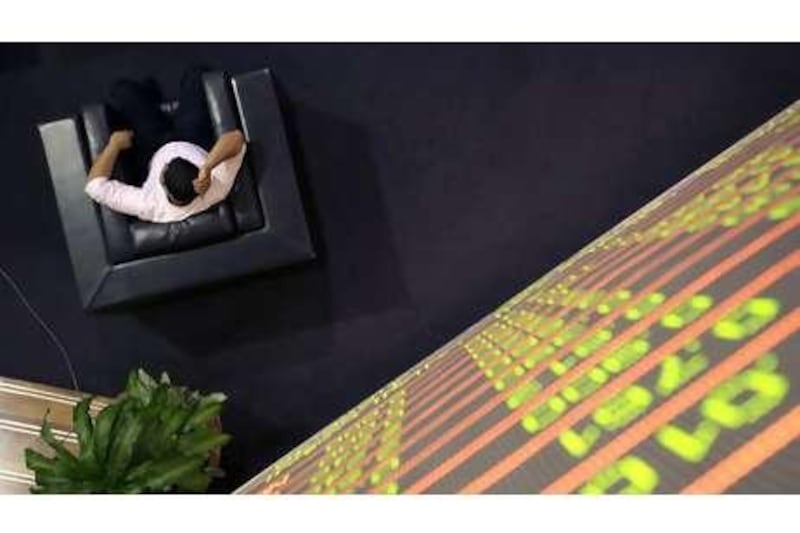Now for the good news, hopefully. After last week's bombshells, such as Dubai Holding Commercial Operations Group (DHCOG) reporting a loss of Dh23.56 billion (US$6.41bn) last year against a profit of Dh10bn in 2008, investors are hoping for a quieter ride.
Ahmad bin Byat, the chief executive of DHCOG, said there was no need to restructure the company's debts and that its loans could be rolled over on commercial terms. The market was not helped by media reports on Thursday, later denied, that DHCOGwas seeking, after breaking a "banking covenant", to roll over a $555 million credit facility with Standard Chartered Bank, Citigroup and Royal Bank of Scotland Group that matures next month.
The Dubai Financial Market (DFM) closed lower on Thursday while all other regional markets rose, drawing strength from rising oil prices and a bounce-back in global equities. The trouble is, world markets eased on Friday because of worse-than-expected employment figures from the US. For investors, below-expectation financial performance is part of a wider Dubai debt story. This began in November with Dubai World seeking a standstill agreement with its lenders and trade creditors, which appears now to have been settled.
It now appears that Dubai Holding, the parent of DHCOG, is another government-related entity that might need to restructure its debt. Its subsidiaries have already appointed advisers to assess their best options. Investors are hoping, however, that there is no more bad news on the horizon and that the markets will start to rebound. "The news should already be priced in. I don't think the market deserves to shed more, based on Dubai Holding financial strength," said Yazan Abdeen, a fund manager at ING Investment Management in Dubai. "It is not a situation of 2008, where we saw an asset bubble burst. Valuations are now holding, and the market should be confident that the skeletons are out of the closet."
The DFM General Index was the largest loser last week, falling 4 per cent to end the week at 1,541.80, while the Abu Dhabi Securities Exchange General Index retreated 2.7 per cent to 2,571.06. The Emirates Securities Index declined last week by 3.1 per cent to 2,517.8, while the ADIB Islamic Index on the MSCI UAE dropped by 2.5 per cent to 947.3. The Muscat and Kuwait indexes declined 1.8 and 1.1 per cent to 6,195.09 and 6,733.50, respectively.
The Saudi Tadawul All-Share Index was the major winner with an aggregate rise of 2.4 per cent to 6,001.38, while Qatar's measure rose 1.8 per cent to 6,803.25. Recent declines have wiped out year-to-date gains for all regional markets, with Dubai falling 14.5 per cent and Abu Dhabi retreating 6.3 per cent, respectively, as the two top losers in the GCC. "Barring major negative news in the region, the international catalysts should help the regional markets in general," said Hassan Awan, an associate with the asset management division at The National Investor in Abu Dhabi.
Oil prices will also determine trading patterns in Saudi Arabia and Qatar, which have seen sharp falls in recent weeks corresponding with declines in crude prices. @Email:skhan@thenational.ae







